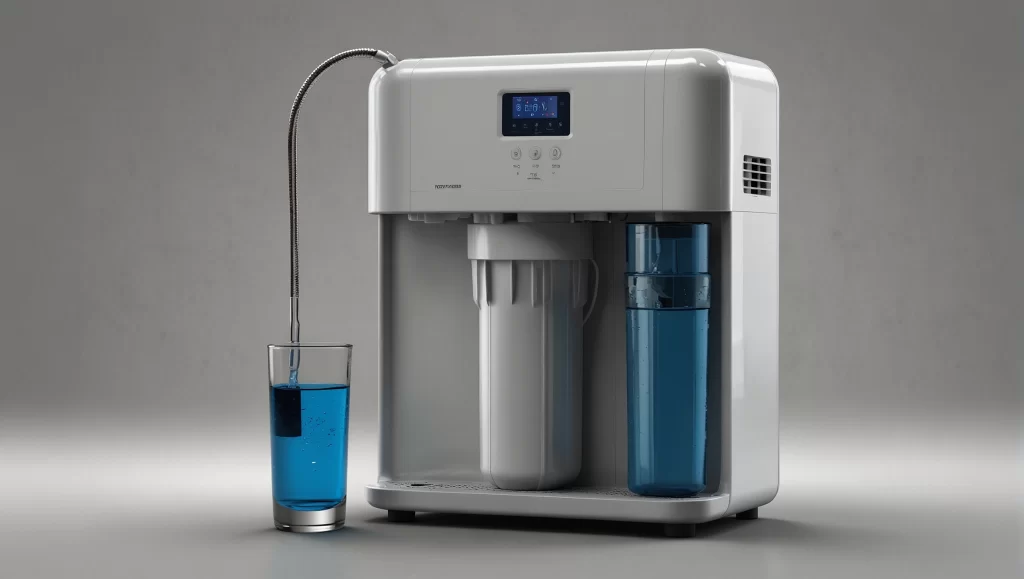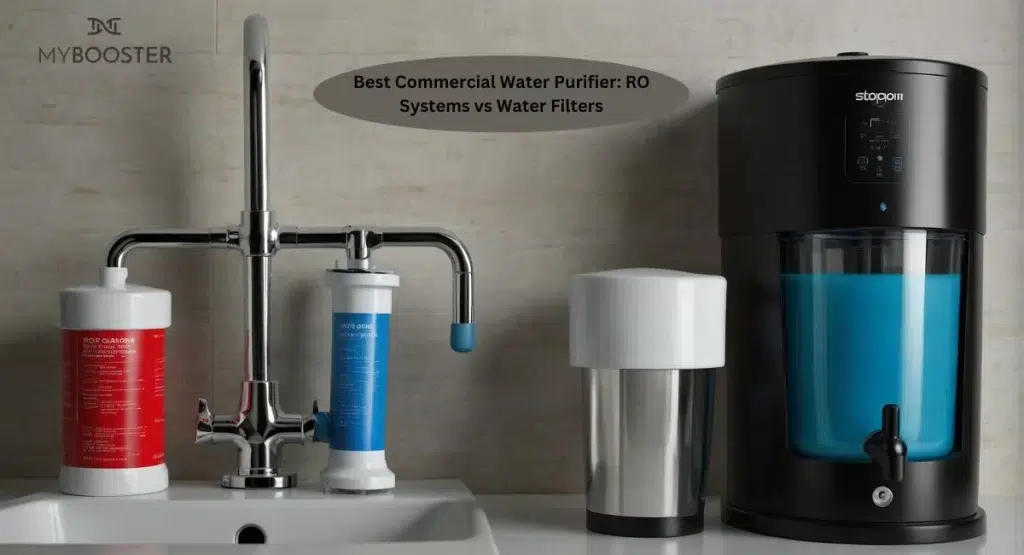Clean water is essential for health, productivity, and quality of life. In the commercial sector, the choice between water purifier Reverse Osmosis (RO) systems and traditional water filters can be pivotal. This article explores the nuances of both options to help you make an informed decision.
–
Understanding RO Systems: The Ultimate Commercial Purification

Reverse Osmosis (RO) systems represent the pinnacle of water purification technology for commercial use. These systems function by pressurizing water through a semi-permeable membrane, which meticulously filters out virtually all contaminants, including minuscule particles and dissolved substances.
The process is so effective that it can remove impurities that traditional filtration methods cannot, such as certain pesticides, herbicides, and heavy metals. This makes RO systems indispensable in sectors where water purity is non-negotiable, such as medical facilities, laboratories, and high-end food and beverage establishments.
–
Water Filters Explained: A Cost-Effective Solution for Businesses
Conventional water filters are the workhorses of the water purification industry. They employ various methods, such as mechanical filtration, activated carbon absorption, and ion exchange, to improve water quality.
These systems are adept at removing common contaminants like sediment, chlorine, and certain organic compounds, which can significantly enhance the taste and smell of water. They are an economical choice for businesses that require better water quality without the significant investment of an RO system.
–
Comparing Efficiency: RO Systems vs Traditional Water Filters
Efficiency in water purification not only pertains to the quality of the output but also to the operational costs and environmental impact. RO systems are highly efficient in terms of purification results but can be less so regarding water and energy usage.
Conversely, water purifier in traditional water filters are generally more efficient in terms of water conservation and energy usage, though they may achieve a different level of contaminant removal than RO systems.
–
The Health Benefits of Advanced RO Water Purification
The health benefits of using an Water purifier in RO system are extensive. By removing contaminants such as lead, arsenic, and nitrates, RO systems reduce the risk of health issues associated with these substances.
The purification process also eliminates bacteria, viruses, and cysts, which can cause serious illnesses. This level of purification is particularly beneficial in settings where individuals are more vulnerable, such as hospitals and schools.
–
Maintenance and Longevity: RO Systems vs Water Filters
The maintenance and longevity of a water purification system are critical factors to consider. RO systems require regular maintenance, including membrane cleaning and filter replacement, to maintain their high level of performance.
While this may require a significant time investment, the systems are often quite durable. Traditional water filters typically have fewer maintenance requirements but may need more frequent replacements depending on the water quality and volume of use.
–
Investment Analysis: Upfront Costs of RO Systems and Water Filters
When considering the investment in a water purification system, it’s essential to look beyond the initial cost. RO systems have a higher upfront cost but can provide long-term savings through producing high-quality water and potential health benefits.
Traditional water filters have a lower initial cost and can be a cost-effective solution for businesses that do not require the intense level of purification provided by RO systems.
–
Taste and Quality: The Water Connoisseur’s Guide to Commercial Purifiers
The taste and quality of water are subjective yet crucial considerations, particularly in industries such as hospitality. RO systems remove a wide range of impurities, resulting in water with a neutral taste often preferred for cooking and beverage preparation.
Traditional filters can significantly improve the taste by removing chlorine and other taste-affecting chemicals but may not address all impurities that can affect water quality.
–
Environmental Impact: Eco-Friendly Water Purification Options
The environmental impact of water purification systems is a growing concern. RO systems are often criticized for the amount of wastewater they produce; however, advancements in RO technology address these concerns. Traditional filters are generally seen as more environmentally friendly, as they produce less waste and consume less energy.
–
Installation Insights: Setting Up Your Commercial Water Purifier
The installation process can vary significantly between different types of water purification systems. RO systems are complex and require professional installation and a pressurized water supply. Traditional filters are more straightforward and can often be installed by the end-users or with minimal professional assistance, which can be a cost-saving advantage.
–
Frequently Asked Question
What is the difference between Filter Water and RO Water?
The primary difference lies in the purification process. Standard filters typically remove physical impurities, while RO systems also remove dissolved substances, providing a higher purity level.
How to choose the correct Commercial RO Filter system for your business?
Selecting the right commercial RO system involves understanding your water source, assessing water quality, and considering factors like flow rate, cost, space, and scalability.
What are the Benefits of RO Water Purification?
RO water purification offers numerous benefits, such as removing up to 99% of contaminants, reducing the risk of waterborne diseases, and providing cleaner, better-tasting water for drinking and cooking.
